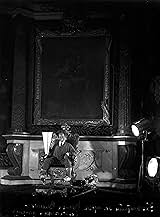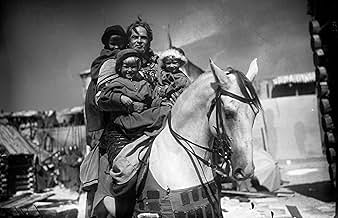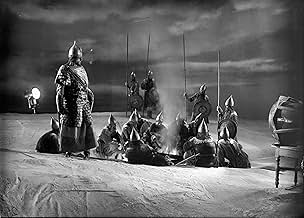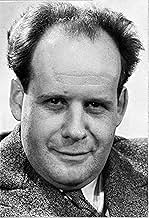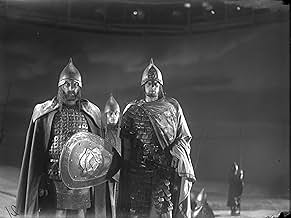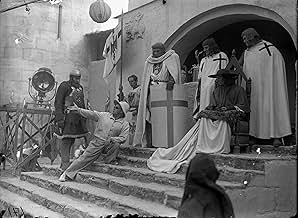PUNTUACIÓN EN IMDb
7,5/10
13 mil
TU PUNTUACIÓN
Añade un argumento en tu idiomaThe story of how a great Russian prince led a ragtag army to battle an invading force of Teutonic Knights.The story of how a great Russian prince led a ragtag army to battle an invading force of Teutonic Knights.The story of how a great Russian prince led a ragtag army to battle an invading force of Teutonic Knights.
- Dirección
- Guión
- Reparto principal
- Premios
- 2 premios en total
Nikolay Cherkasov
- Aleksandr Nevsky
- (as N. Cherkasov)
Nikolai Okhlopkov
- Vasili Buslai
- (as N. Okhlopkov)
Andrei Abrikosov
- Gavrilo Oleksich
- (as A. Abrikosov)
Dmitriy Orlov
- Ignat - the Master Armorer
- (as D. Orlov)
Vasili Novikov
- Pavsha - Governor of Pskov
- (as V. Novikov)
Nikolai Arsky
- Domash Tverdislavich - a Novgorod Boyar
- (as N. Arsky)
Varvara Massalitinova
- Amelfa Timoferevna - Buslai's Mother
- (as V. Massalitova)
Valentina Ivashova
- Olga Danilovna - a Maid of Novgorod
- (as V. Ivashova)
Aleksandra Danilova
- Vasilisa - a Maid of Pskov
- (as A. Danilova)
Sergei Blinnikov
- Tverdilo - Traitorous Mayor of Pskov
- (as S. Blinnikov)
Ivan Lagutin
- Anani - a Monk
- (as I. Lagutin)
Lev Fenin
- The Archbishop
- (as L. Fenin)
Naum Rogozhin
- The Black-Hooded Monk
- (as N. Rogozhin)
Nikolai Aparin
- Mikhalka
- (sin acreditar)
Boris Belyakov
- Rytsar
- (sin acreditar)
A. Gulkovski
- Teutonic Knight
- (sin acreditar)
Avenir Gulkovskiy
- rytsar Tevtonskogo ordena
- (sin acreditar)
Reseñas destacadas
10ekeby
I've loved this movie since the first time I saw it lo these many years ago. I'm not sure how many times I've seen it, perhaps 10, perhaps 20. This last time I watched it I was struck by a detail that I hadn't noticed before.
Toward the end of the picture, the slain heroes are conveyed back to the town via sled. There are a couple of closeups of the dead men. The one that struck me most was a shot of the blond youth. All you see on the screen is his profile from head to hands. His hands hold a flickering candle. The wind is blowing and his thick blond hair is dancing in the wind, in sync with the flicker of the candle flame. The contrast between death and the life he has lost is incredibly powerful. The moving hair and candle flame remind us of the life force that once inhabited his body.
Every time I revisit this film I see something new.
Toward the end of the picture, the slain heroes are conveyed back to the town via sled. There are a couple of closeups of the dead men. The one that struck me most was a shot of the blond youth. All you see on the screen is his profile from head to hands. His hands hold a flickering candle. The wind is blowing and his thick blond hair is dancing in the wind, in sync with the flicker of the candle flame. The contrast between death and the life he has lost is incredibly powerful. The moving hair and candle flame remind us of the life force that once inhabited his body.
Every time I revisit this film I see something new.
Eisenstein's "Alexander Nevsky" was made mostly for propaganda purposes in 1938. It was a reminder to all Russians of their dastardly neighbors (the Nazis) to their west. The film plays on this comparison and several others to a lesser degree. The evil Germanic Teutonic Knights just happen to be of the Christian faith and their religious leaders make for very effective villians. Although Nikolai Cherkasov as Nevsky and Nikolai Okhlopkov as his right-hand man, Vasili, are commanding in their roles, this movie is mainly noted for the final climactic battle between good (the Russians) and pure evil (the Germans). Eisenstein purposely covers the Germans with over-sized helmets so that they're totally devoid of any human facial expressions. On the contrary, the Russian peasants who comprise most of Nevsky's army are portrayed with a variety of emotions and their humanity is not only recognizable but refreshing and appealing to the viewer. When the Teutonic Knights make their charge on the Russian position, the action is fast and furious and it would be difficult to find any other film which stages its action scenes as well as Eisenstein does here. Although a bit dated in the print that I saw (the sound was certainly a bit off) this movie is a must-see for anyone interested in foreign films and especially the Russian cinema during the days of Stalin. The Germans might have thought twice about attacking Russia in 1941 if they had seen this film beforehand. The message was clear back then. In the words of Alexander Nevsky himself: "Do not enter Russia with a sword in your hand." Well, you can't say they weren't warned.
Alexander Nevsky (1938) is a brilliant piece of cinematic propaganda. The people of Russia are threatened by two major enemies, the Mongols and the Teutonic Knights of the Holy Roman Empire. In ordered to unite the warring, rival Princes in the Russian Realm, Nevsky takes charge and fights the lesser of two evils (The Teutonics). This influential film was copied many times over and it still holds up to this day. The soundtrack by composer Prokiev and Eisentstein's direction are a sight and sound to behold Many years later, John Milius used many of the movies scenes, set pieces and costumes from this film and incorporated them into Conan.
One of my favorite lines from Conan was taken from this movie. "It's not the strength of the iron in a weapon but the strength of the person that wields it is what matters." The comparisons are unmistakable. The armor that James Earl Jones and the Leader of the Teutonic Knights wear are virtually identical. A true tribute paid from one director to another.
I give Alexander Nevsky one of my highest recommendations. The movie plays like the final Act of Richard III. The presence of Prince Alexander on the screen is truly amazing.
One of my favorite lines from Conan was taken from this movie. "It's not the strength of the iron in a weapon but the strength of the person that wields it is what matters." The comparisons are unmistakable. The armor that James Earl Jones and the Leader of the Teutonic Knights wear are virtually identical. A true tribute paid from one director to another.
I give Alexander Nevsky one of my highest recommendations. The movie plays like the final Act of Richard III. The presence of Prince Alexander on the screen is truly amazing.
Guys, before saying that Alexander Nevsky is a propaganda film, please keep in mind that it is about a Russian saint, prince and patriot and it was produced in the country which totally denied religion, patriotism and nobility. If you look more attentively you can notice that the Novgorod churches had no crosses on top. The full helmets Eisenshtein took from ancient manuscripts and followed the history precisely. The portable organ the monk plays was an exact copy of the real thing from the 13th century which crusaders used. The children auto-da-fe was taken from ancient chronicles (both Russian and German). But in addition it had religious meaning since it draws parallel with Herod's slaughter of the innocents (used later once again in Ivan The Terrible). Alexander Nevsky is a Russian historical saga which has everything in common with old Russian cultural and historical tradition but nothing (or very little) with the Soviet propaganda. The film definitely has allusions to the Stalin's time: free Novgorod republic fights for its freedom at the expense of prosperity, elected prince Alexander (leader but not czar) etc. But nevertheless I think that the French critic Robert Brasillach (he was very close to nazis) was right when he called Alexander Nevsky the slavic war carol which has nothing to do with bolshevism, communism etc.
But IMHO Serghey Eisenshtein was against the war and followed the tradition of War And Peace by Leo Tolstoy. The same plot with common people uniting to oppose the uppish professional army. If you remember the scene when Russian soldiers alike in color with the earth and trees butted into the German close formation they use axes the same way they did when chopping woods. No pride, honor or awards but every day job. I think it is an excellent film which is larger then our judgements.
But IMHO Serghey Eisenshtein was against the war and followed the tradition of War And Peace by Leo Tolstoy. The same plot with common people uniting to oppose the uppish professional army. If you remember the scene when Russian soldiers alike in color with the earth and trees butted into the German close formation they use axes the same way they did when chopping woods. No pride, honor or awards but every day job. I think it is an excellent film which is larger then our judgements.
At school I was taught how some shots were called and there were two directors constantly mentioned : Orson Welles and Sergei M. Eisenstein. I didn't care that much then (I was a kid!) but now I know why, Eisenstein is a genius and it is a shame to see what was possible in 1938 where as almost more than a half century we're stuck with countless blank movies! Some say this movie isn't worth the genius of Eisenstein (then they have to watch it over and over till they can say anything bad) or even worse that it is just some propagandamovie for the Russians. Let's say it as it is, it is indeed pure propaganda for patriotism but isn't "Saving private Ryan" or "The longest day" so? I could sum up so many movies in where America is being raised to the top so why not Russia, and besides every war is fought for itrs patriotism why else would they raise flags? Aleksandr Nevsky is a must for anyone who cares about cinematography as almost every shot is a sublime picture. Perhaps it's all overseen but I am in wonder why this isn't included in IMDB's Top 250 where as there is so many overrated Oscarcrap in it as well.
¿Sabías que...?
- CuriosidadesJoseph Stalin wanted this film to be a propaganda tool to warn Soviet citizens to be wary of German aggression. However, it was rejected at first due to it being "too anti-German", as it came out shortly before the Soviet-German non-aggression pact of 1939 was signed. In 1941, the peace was broken and Stalin reportedly demanded that it be shown in every Soviet movie theater as a rallying cry against the invasion.
- PifiasGavrila Alexich, one of the movie's main protagonists, could not participate in the Battle of Ice. He was killed one year before it, in 1241, storming the fortress of Koporye.
- Citas
Alexandr Nevsky: Go tell all in foreign lands that Russia lives! Those who come to us in peace will be welcome as a guest. But those who come to us sword in hand will die by the sword! On that Russia stands and forever will we stand!
- Créditos adicionalesBefore the word "End" appears Alexandr Nevsky's famous quote "But those who come to us sword in hand will die by the sword! On that Russia stands and forever will we stand!" appears on the screen, right after Nevsky said it in the movie.
- Versiones alternativasA new edition appeared on video in 1995 with the entire Prokofiev score newly recorded in hi-fi stereo, using the same 1938 orchestrations and perfectly synchronized to the original 1938 dialogue and sound effects tracks, so that it is now possible to see and hear the film exactly as it always was, with the exception being that the music is now heard in hi-fi sound, rather than the tinny 1938 recording.
- ConexionesEdited into Los hechiceros de la guerra (1977)
Selecciones populares
Inicia sesión para calificar y añadir a tu lista para recibir recomendaciones personalizadas
- How long is Alexander Nevsky?Con tecnología de Alexa
Detalles
Taquilla
- Recaudación en todo el mundo
- 2226 US$
- Duración1 hora 52 minutos
- Color
- Mezcla de sonido
- Relación de aspecto
- 1.37 : 1
Contribuir a esta página
Sugerir un cambio o añadir el contenido que falta

Principal laguna de datos
By what name was Alexander Nevsky (1938) officially released in India in English?
Responde
